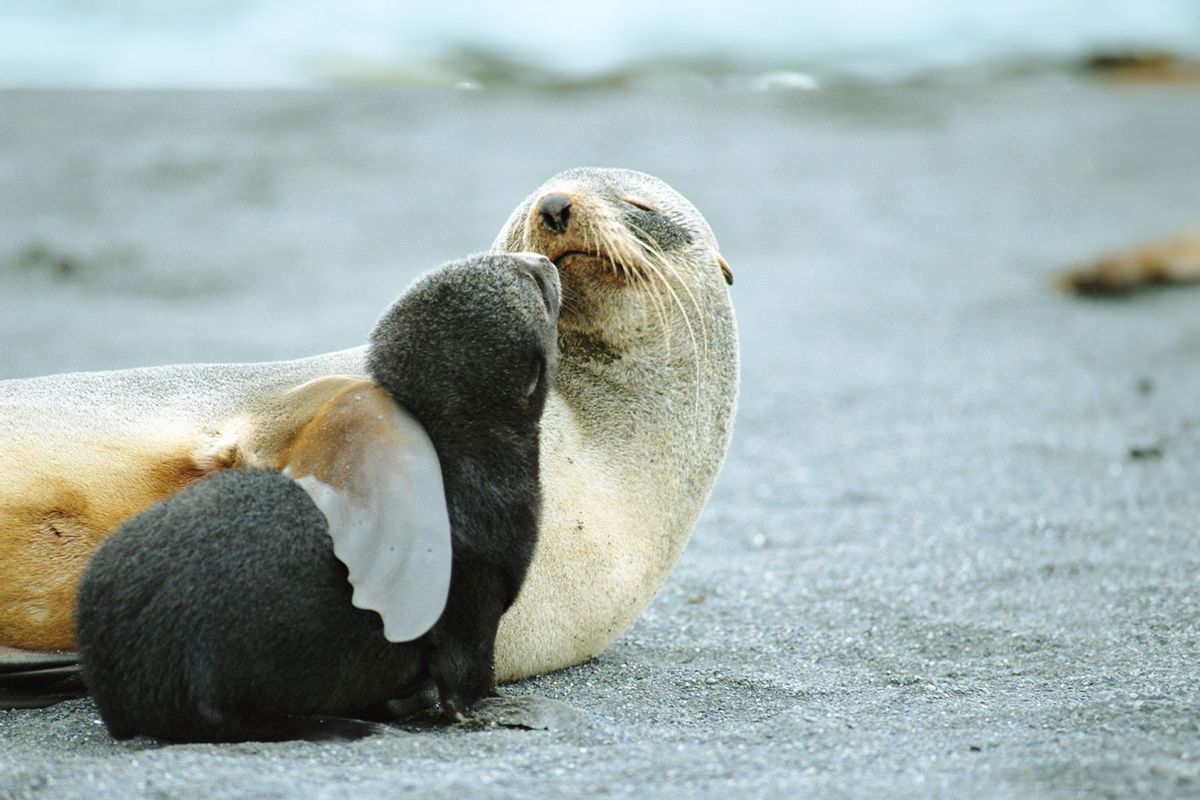The Antarctic fur seal (Arctocephalus gazella) is among the most beloved sea animals, with its wet puppy dog eyes, big white whiskers, rolly poly gray body and slippery flippers. Unsurprisingly, the fur seal is almost universally regarded as adorable. The act of clubbing one for its fur is a horrific practice that has thankfully been banned — but in a way, humans are still clubbing these animals over the head with drastic changes to the global climate.
As explained by the authors of a recent study in the journal Global Change Biology, Antarctic fur seals are a "key indicator species" that helps scientists learn more about the overall health of the ecosystem in the subantarctic islands of South Georgia, where nearly all fur seals live. Perhaps this is why it is so troubling that, according to those same researchers, South Georgia fur seal populations are on the decline — and that one major culprit is climate change.
The recent population crash is particularly disappointing because it reverses a century of population recovery.
“We found both good and bad news about the fur seals," Jaume Forcada, a British Antarctic Survey (BAS) scientist who led the new study, said in a statement. "The population has recovered very impressively throughout the twentieth century when seal hunting was banned. But twenty-first century changes to the abundance of krill in the Southern Ocean are now threatening these iconic animals all over again.”
Although the BAS scientists studied whether krill fishing pressure might have played a role in the dropping seal populations, they found this to not be the case. This is not to say that they felt that this variable should not be investigated, nor for that matter that climate change alone accounts for the declining seal populations.
"The effects of krill extraction on fur seal populations should be re-evaluated in the light of increasing environmental pressures on both the krill and the fur seals," the scientists write. "Besides climate warming, these pressures include the effects of regional humpback whale recovery ... and its direct competition for food with fur seals and other abundant krill-dependent predators such as macaroni penguins."
The problem for the fur seals, when it comes to climate change, is that the krill are struggling to survive in the warming ocean temperatures. Because krill comprise roughly 80% or more of the diet of fur seals at South Georgia, the decline in krill populations means the seals will experience "catastrophic declines" both in how many pups they can produce and the number of individuals overall that can survive. "Environmental conditions remove the krill from their immediate foraging areas," the authors explain.
The recent population crash is particularly disappointing because it reverses a century of population recovery, one that resulted in a peak of 3.5 million individuals in 2009. In the early 20th century, by contrast, there were so few fur seals still alive in the wild that conservationists intervened, deeming that they should no longer be hunted commercially. Over the previous two centuries, fur seals were prized for their pelts and therefore slaughtered in the millions. Only strict protections, along with an abundance of food and the seals' natural breeding abilities, allowed their populations to bounce back.
Yet at Bird Island, a South Georgia location with a large fur seal community, the 2009 population peak was followed by 7% declines in every succeeding year. Presently the fur seal population at Bird Island is at its lowest since the 1970s, when the animals were still in recovery.
Want more health and science stories in your inbox? Subscribe to Salon's weekly newsletter Lab Notes.
"Environmental conditions remove the krill from their immediate foraging areas."
Climate change is not the only threat that is afflicting seals and other pinnipeds, the group of carnivorous aquatic mammals that includes seals and sea lions. Plastic pollution is also rapidly killing these animals, as Salon learned last year when speaking with Dr. Kim Warner, a senior scientist at the nonprofit Oceana and co-author of a 2020 report on how both sea turtles and marine mammals suffer because of plastic pollution along the coast of the United States.
"What is really sad is that a lot of these species that we were studying are threatened with or vulnerable to extinction under the Endangered Species Act," Warner explained. "These are besides all the dangers they face from other threats to their survival. It's an added stressor and sometimes the cause of death for these animals that are either ingesting or becoming entangled with plastic."
We need your help to stay independent
Plastic pollution is such a pervasive problem for seals that the famous activist group Ocean Conservation Namibia, which has 1.73 million subscribers on YouTube, exists for the main purpose of helping individual seals get disentangled from plastic pollution of all kinds, with one member of the organization estimating to Salon last year that "probably excess of 70% of all our entanglements are directly fishing-related."
As John Hocevar, a marine biologist and director of Greenpeace's oceans campaign, also told Salon last year, "There are beaches in Hawaii where you can literally watch the plastic come in, with every wave on some beaches. You can see the microplastics with your naked eyes in your hand among the grains of sand that you pick up. And a lot of it is clearly coming from fishing gear."



Shares